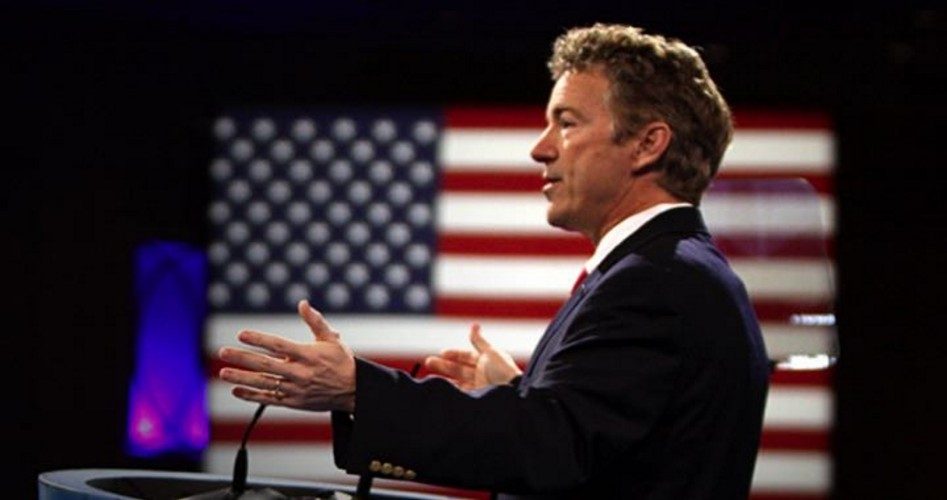
Stand with Rand version 3.0.
On Monday night, Senator Rand Paul (R-Ky.), shown, sat all but alone in the Senate chamber. He sat in silent protest of the failure of Congress to renew authority to continue prosecuting the now 16-year war in Afghanistan and Iraq. “I sit nearly alone, but that’s fine. I’ll fight by myself if need be. This is too important,” Paul tweeted from his lonely outpost of liberty.
In a series of tweets, Paul defended his defiance.
“Tonight, the Senate is attempting to move forward with the Defense Bill,” he posted on Twitter. “I will object to all procedural motions and amendments unless and until my amendment is made in order and we vote on these wars. An attempt was made to run the clock on the bill overnight. I objected and am now sitting on the floor of the Senate.… I sit silently to protest the thousands of American soldiers who have died over the past decade in these wars. We have been there for 16 years. It is time for them to end. It is time for Congress to vote on whether or not they should end.”
Via his Twitter account, the senator called on the “constitutional conservative right” to “demand Congress reclaim its war powers.” Similarly, he asked, “Where is the anti-war left demanding the wars end?”
Both sides, it appears, prefer perpetual war to promoting their own self-proclaimed principles: strict adherence to the Constitution on the Right and opposition to unjust foreign wars on the Left.
In an article published on rare.com on September 11, Senator Paul, a seemingly unextractable thorn in the side of Republican Party leadership (all of whom favor ceding war powers to the president and bombing our way into peace), explained why he is demanding debate on reauthorization of the current Authorization for Use of Military Force (AUMF) that has existed since 2001.
As Congress takes up the 2018 National Defense Authorization Act (NDAA), I will insist it vote on my amendment to sunset the 2001 and 2002 Authorizations for the Use of Military Force.
Why?
Because these authorizations to use military force are inappropriately being used to justify American warfare in 7 different countries. Sunsetting both AUMFs will force a debate on whether we continue the Afghanistan war, the Libya war, the Yemen war, the Syria war, and other interventions.
Our military trains our soldiers to be focused and disciplined, yet the politicians who send them to fight have for years ignored those traits when developing our foreign policy.
He continued, calling out his congressional colleagues, insisting that they reclaim their constitutional authority over the power to declare war:
It’s time to demand the policymakers take their own jobs as seriously as the men and women we ask to risk it all for our nation.
Doing so means restoring constitutional checks and balances. Congress has no greater responsibility than defending our country, and the Founders entrusted it with the power of declaring war because they wanted such a weighty decision to be thoroughly debated by the legislature instead of unilaterally made by the Executive branch.
Yet Congress has largely abdicated its role anyways, and its sidekick status was plainly evident when former President Obama proposed a new AUMF for the fight against ISIS while insisting he really had all the authority he needed — it being more of a “wouldn’t it be nice” afterthought than an acknowledgement of any required step.
Repealing the 2001 and 2002 AUMFs would restore respect for the balance of power and reassert Congress’ voice by forcing legislators to specifically approve or disapprove the direction of our foreign policy. If my provision passes, the authorizations would sunset six months later, allowing Congress time for a thorough debate about how we will move forward.
To those of among his colleagues and among the so-called conservatives who challenge Paul’s patriotism and his commitment to defending the United States, Paul tweeted, “We can defend without question against all invaders. And yet, we are not very good at making countries out of places that aren’t.”
Paul’s intransigence on the issue of congressional war power is in line with the position of our Founding Fathers.
In a letter to Thomas Jefferson written in 1798, James Madison explained to his frequent collaborator why the Constitution placed exclusive control over declaring war in the legislative branch:
The constitution supposes, what the History of all Governments demonstrates, that the Executive is the branch of power most interested in war, and most prone to it. It has accordingly with studied care, vested the question of war in the Legislative. But the Doctrines lately advanced strike at the root of all these provisions, and will deposit the peace of the Country in that Department which the Constitution distrusts as most ready without cause to renounce it.
For those of you interested in a longer explanation by Madison, I encourage you to read the Helvidius-Pacificus debates of 1793-1794, wherein Madison schools his former collaborator Alexander Hamilton on the reason the Constitution placed the war powers in the hands of the representatives of the people.
Finally, to Senator Paul go the last words, perhaps the most important and inspiring of the words he has spoken and written over the past two days. “I took an oath to protect & defend the Constitution. I take that oath seriously & will continue to fight for liberty in the 115th Congress.”
His colleagues would do well to do likewise.
Photo of Rand Paul: Official site of Rand Paul



